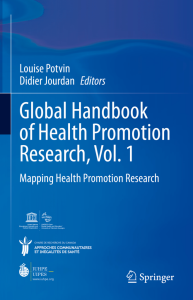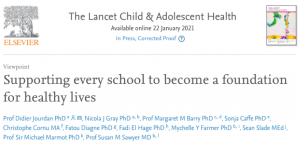Watch the video of the Webinar on School issues in children during COVID-19 organized by the International Pediatric Association (IPA), UNICEF and WHO.
On 2 November, IPA, UNICEF and WHO organised a webinar in French on “School issues in children during COVID-19”. The invited experts spoke about the difficulties of the child in school during the COVID-19 pandemic. They highlighted the significant impact on schoolchildren in terms of learning, loss of opportunities but also the consequences on dropping out of school. This webinar wished to return to the issues in order to better guide professionals towards a successful return to school by following the recommendations.
Pr. Rachida Boukari from the University of Alger, host and moderator of this webinar, was surrounded by experts:
- Didier Jourdan, holder of the UNESCO Chair Global Health & Education presented “Data from a study of professionals from 42 countries on the process of reopening schools”
- Mbola Mbassi, Doctor and public health expert at national and international level spoke of the “WHO School Health Services Guidelines for COVID-19”
- Joseph Haddad, Professor of Pediatrics and Neonatology at Saint George Beirut University Hospital, Lebanon raised “The challenges of Education and Disability in children and COVID-19”.
Pr. Didier Jourdan recalled the interest of this survey which was to collect the points of view of professionals in the field, testimonies from the field on the possible reopening of schools in different countries, and on the successes and difficulties encountered in reopening schools.
In his review of the “WHO School Health Services Guidelines for COVID-19” Dr. Symplice Mbola Mbassi mentioned that schools have been closed in over 190 countries, reaching 90% of the global student population. He added that school closures have exposed children to more anxiety, depression, violence, physical inactivity, poor diet, loss of learning, sedentary lifestyle and increased screen time but also for parents an increase in unmet childcare needs. Dr. Symplice Mbola Mbassi pointed out that schools are places of protection, of learning opportunities. They provide social protection, nutrition, physical activity but also emotional support.
Finally, Pr. Joseph Haddad talked about “The challenges of education and disability in children and COVID-19”. He emphasized the importance of a comprehensive approach to the care of children with disabilities that ensures dignity, based on the rights and needs of these children. The rights of these children are the same as to others, such as the right to education, medical care, rehabilitation, social support and social integration.
Watch the video: https://www.youtube.com/watch?v=JJHqv-vlia0




 About Didier Jourdan
About Didier Jourdan
